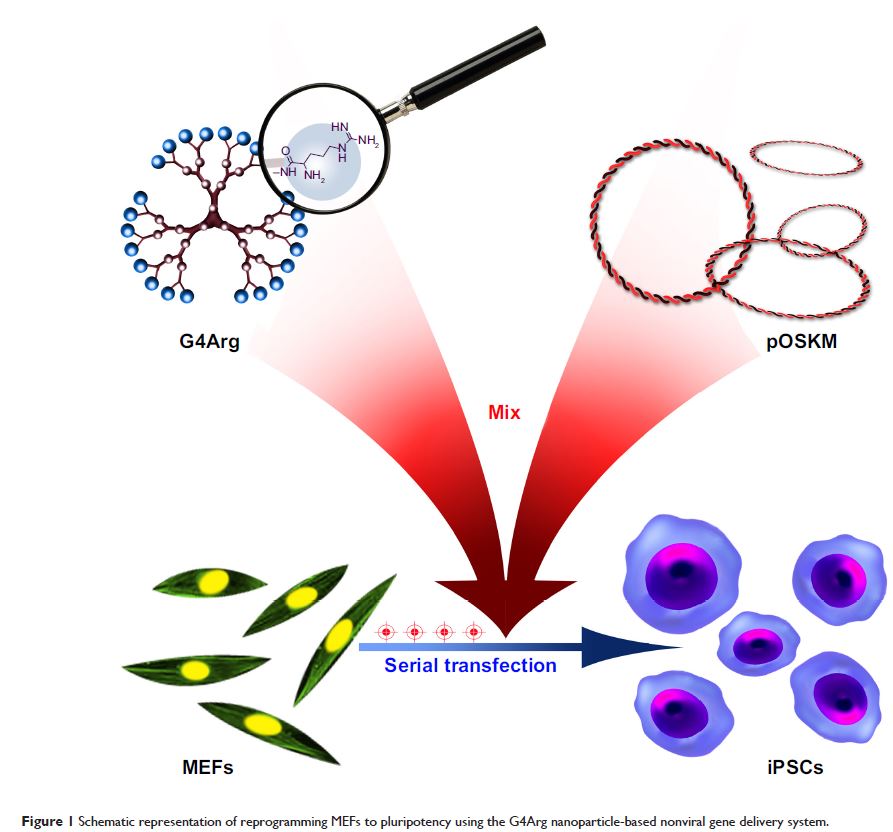108384
论文已发表
注册即可获取德孚的最新动态
IF 收录期刊
- 3.4 Breast Cancer (Dove Med Press)
- 3.2 Clin Epidemiol
- 2.6 Cancer Manag Res
- 2.9 Infect Drug Resist
- 3.7 Clin Interv Aging
- 5.1 Drug Des Dev Ther
- 3.1 Int J Chronic Obstr
- 6.6 Int J Nanomed
- 2.6 Int J Women's Health
- 2.9 Neuropsych Dis Treat
- 2.8 OncoTargets Ther
- 2.0 Patient Prefer Adher
- 2.2 Ther Clin Risk Manag
- 2.5 J Pain Res
- 3.0 Diabet Metab Synd Ob
- 3.2 Psychol Res Behav Ma
- 3.4 Nat Sci Sleep
- 1.8 Pharmgenomics Pers Med
- 2.0 Risk Manag Healthc Policy
- 4.1 J Inflamm Res
- 2.0 Int J Gen Med
- 3.4 J Hepatocell Carcinoma
- 3.0 J Asthma Allergy
- 2.2 Clin Cosmet Investig Dermatol
- 2.4 J Multidiscip Healthc

使用基于终止精氨酸的聚酰胺纳米微粒对纤维母细胞重组为多能性的非病毒基因输送系统
Authors Zhu K, Li J, Lai H, Yang C, Guo C, Wang C
Published Date December 2014 Volume 2014:9(1) Pages 5837—5847
DOI http://dx.doi.org/10.2147/IJN.S73961
Received 8 September 2014, Accepted 25 October 2014, Published 12 December 2014
Abstract: Induced
pluripotent stem cells (iPSCs) have attracted keen interest in regenerative
medicine. The generation of iPSCs from somatic cells can be achieved by the
delivery of defined transcription factor (Oct4, Sox2, Klf4, and c-Myc[OSKM]).
However, most instances of iPSC-generation have been achieved by potentially
harmful genome-integrating viral vectors. Here we report the generation of
iPSCs from mouse embryonic fibroblasts (MEFs) using arginine-terminated
generation 4 polyamidoamine (G4Arg) nanoparticles as a nonviral transfection
vector for the delivery of a single plasmid construct carrying OSKM (pOSKM).
Our results showed that G4Arg nanoparticles delivered pOSKM into MEFs at a
significantly higher transfection efficiency than did conventional transfection
reagents. After serial transfections of pOSKM-encapsulated G4Arg nanoparticles,
we successfully generated iPSCs from MEFs. Our study demonstrates that G4Arg
nanoparticles may be a promising candidate for generating of virus-free iPSCs
that have great potential for clinical application.
Keywords: mouse embryonic
fibroblasts, induced pluripotent stem cells
